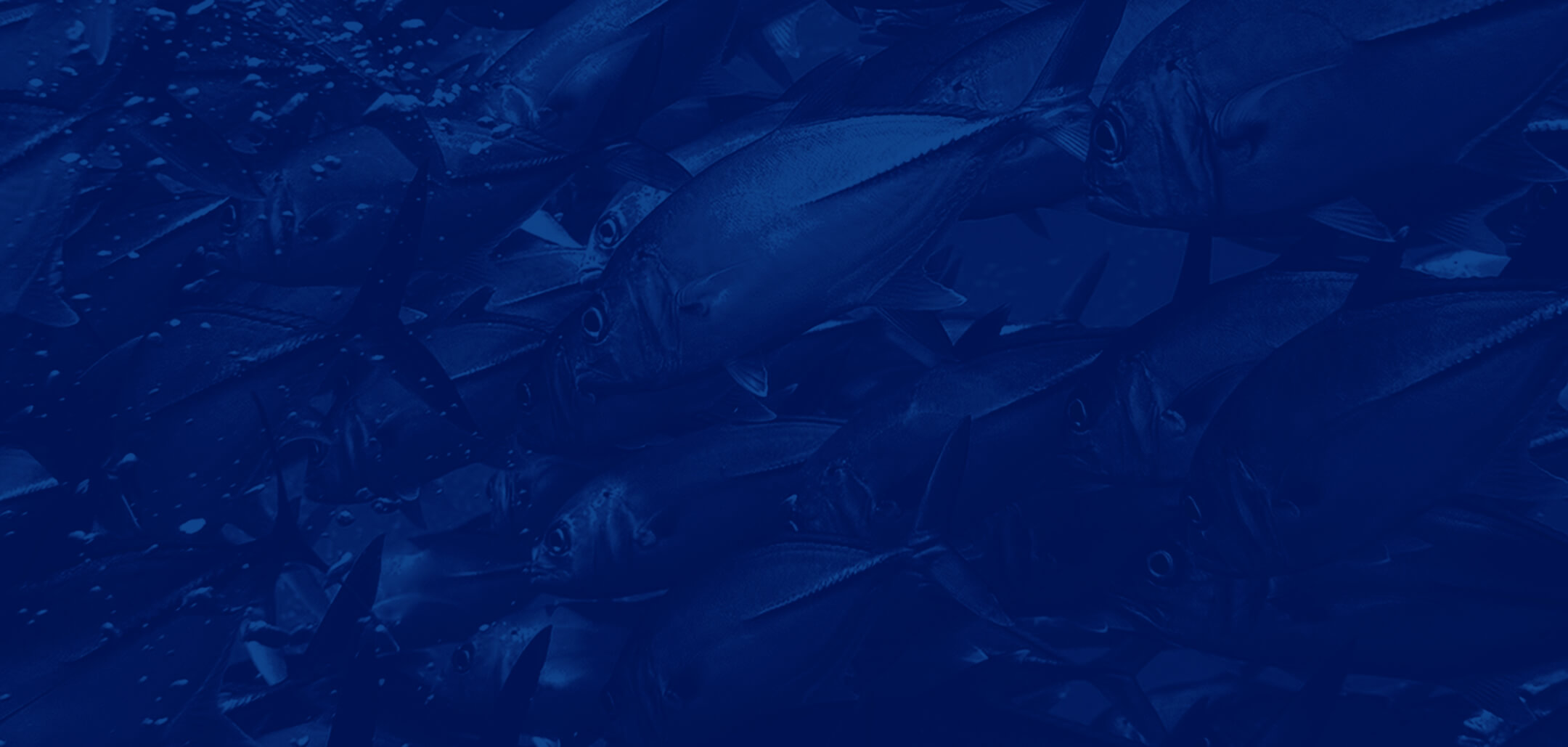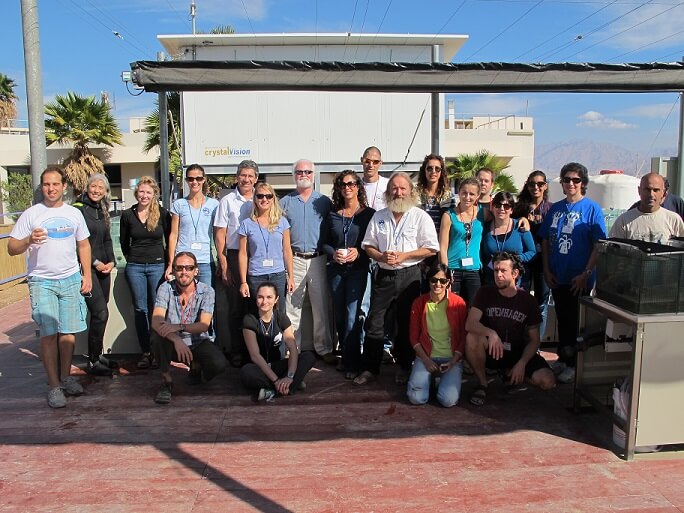Researchers from six nations gather for the 1st International Workshop on Impacts of Ocean Acidification and Climate Change on Corals and Coral Reefs, which was led by Mote Marine Laboratory and the Interuniversity Institute for Marine Sciences in Eilat, Israel and took place Dec. 6-10 in Eilat. The workshop allowed top scientists with many different specialties to team up for a marathon of intensive, novel studies focusing on the environmental changes that threaten coral reefs worldwide. (Credit: Interuniversity Institute for Marine Sciences)
Research on ocean acidification and climate change — major threats to coral reefs — took a leap forward during a recent international workshop in Israel, where scientists and students from six nations exchanged knowledge and partnered for a marathon of intensive, novel studies.
The 1st International Workshop on Impacts of Ocean Acidification and Climate Change on Corals and Coral Reefs was co-hosted by Mote Marine Laboratory, which is based in Sarasota, Fla., and the Interuniversity Institute for Marine Sciences (IUI) in Eilat, Israel. It took place Dec. 6-10 in Eilat and brought together participants from the Germany, Israel, Italy, the Netherlands, the U.K. and the U.S.
“Mote is committed to enhancing our ability to conduct innovative studies on, and serve as a global research center for partnering with others to examine impacts of ocean acidification on the resiliency and recovery of coral reef ecosystems,” said Dr. Michael P. Crosby, President and CEO of Mote. “We were, therefore, pleased to join with our colleagues at the Interuniversity Institute to invite a diverse international group of trailblazing researchers and next-generation scientists to put their heads together, share what they’ve learned and move their fields forward with some of the most novel experiments to date on these global threats to coral reefs. We’re thrilled with the results.”
Dr. Amatzia Genin, IUI Scientific Director, said he shared Crosby’s excitement. “This gathering of world-leading researchers and students to study ocean acidification and climate change effects on corals is unprecedented scientifically and socially. We expect these studies, which use a unique experimental facility located less that 100 yards from a flourishing Red Sea reef, will shed new light on biological processes driven by global change and provide an outstanding motivation to expand this unique international collaboration for the benefit of the world’s coral reefs.”
Corals around the globe are facing environmental stress that causes them to lose their symbiotic algae through a process called coral bleaching, and eventually die. Such stress may also be causing significant shifts in the microbial communities living in the marine environment, potentially putting the health of corals and other life forms at risk.
Some of the greatest environmental stressors on Earth are being caused by emissions of carbon dioxide. These threats are climate change and ocean acidification — the lowering of ocean pH when carbon dioxide dissolves into the sea. This water chemistry change is often called the “osteoporosis of the sea” because it is expected to weaken and even dissolve calcium carbonate structures such as coral skeletons and mollusk shells, and it may affect a wide swath of other marine animals and ecosystems.
During the recent workshop, participants conducted lab and field experiments with corals and associated life forms from the Red Sea to study how ocean acidification and climate change might relate to:
- Microbial communities, such as beneficial or harmful bacteria found on corals
- Coral metabolism and calcification
- Waterborne nutrients, their effects on corals and associated life forms
- Dinoflagellates (a type of microscopic plankton) associated with corals
- Coral mucus production and characteristics
- Physiology of the symbiotic, microscopic algae that live in coral tissues and are required for coral survival
- Bivalves and other organisms with calcium carbonate shell
“To our knowledge, no one has ever conducted such a comprehensive study with so many factors in the context of ocean acidification research,” said Dr. Erinn Muller, Postdoctoral Fellow at Mote.
Fellow participant Dr. Maoz Fine, Senior Lecturer at IUI, added: “The workshop was unique in bringing together students and researchers who are studying ocean acidification and climate change to work together while sharing data generated from different sections of the experiment.”
The scientists divvied up samples of corals and associated life forms that had been grown since October in IUI’s new ocean acidification facility. The facility simulates future ocean conditions using 80 controlled aquariums and a robot that monitors their water pH, temperature and dissolved oxygen, allowing scientists to monitor corals under varied levels of acidity, temperature and added nutrients.
The schedule was full and the progress was exciting, Muller said. “In a few days we completed two major experiments that would normally have taken months.”
The researchers are analyzing their findings and hope to publish them in peer-reviewed scientific journals.
Partial support for this workshop was provided through the Mote-Israel Cooperative Marine Research Program, which is seeking funding support to host the 2nd International Workshop on Ocean Acidification Impacts to Corals and Coral Reef Ecosystems in 2014 at Mote’s Tropical Research Laboratory in the Florida Keys.
To make a donation to the Mote-Israel Cooperative Program, please contact Tom Waters at: 941-388-4441, ext. 352 or waters@mote.org
About the Mote-Israel Cooperative Program
Mote has a long history of research in Israel and collaborations with scientists there. Mote’s Founding Director, famous “Shark Lady” Dr. Eugenie Clark, conducted some of her early fish and shark research in the 1950s with colleagues in the Red Sea.
Mote’s President and CEO, Dr. Michael P. Crosby, has worked closely with top Israeli researchers since 1994. He led U.S., Israeli and Jordanian partners in the Red Sea Marine Peace Park Cooperative Research, Monitoring and Management Program — an effort to protect coral reefs that support thousands of species in the Gulf of Aqaba. He is also a former chairman of the United States-Israel Binational Science Foundation Board of Governors and has served on the Board since he was appointed by the U.S. State Department in 2002.
In 2011, Mote expanded its international efforts with the creation of the Mote-Israel Cooperative Marine Research Program.
This program is designed to support research initiatives that benefit the environments of both nations, fund travel between the U.S. and Israel for researchers and support postdoctoral research scientists.
Participants from the organizations leading the recent workshop included:
Mote:
- Dr. Michael P. Crosby, President and CEO
- Dr. Emily Hall, Manager of the Ocean Acidification Program
- Dr. Erinn Muller, Postdoctoral Fellow
- Dr. Kim Ritchie, Manager of the Marine Microbiology Program
- Dr. Dave Vaughan, Executive Director of Mote’s Tropical Research LaboratoryIUI:
- Dr. Maoz Fine, Senior Lecturer
- Dr. Amatzia Genin, Scientific Director
- 10 students from IUI


